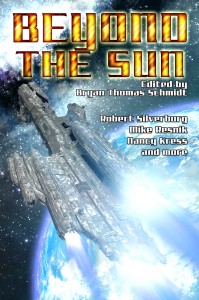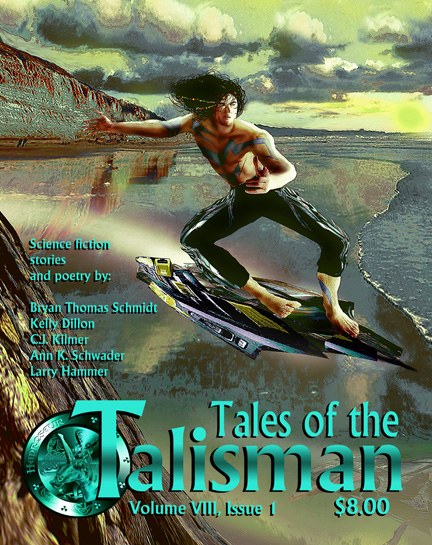 I get asked a lot these days for tips on how to sell stories, etc. One tip, I’ve never heard a lot is learn to write to word counts. But I’d go one further, learn to write low word counts. Why? If an editor gives you guidelines with a range of 3-8k, that doesn’t mean the editor can afford to buy all 8k stories for a magazine issue or anthology. It means they want and need a range. It means, if everyone who submits sends in 8k stories, most of them will wind up rejected, even if their stories are perfectly good. That’s right.
I get asked a lot these days for tips on how to sell stories, etc. One tip, I’ve never heard a lot is learn to write to word counts. But I’d go one further, learn to write low word counts. Why? If an editor gives you guidelines with a range of 3-8k, that doesn’t mean the editor can afford to buy all 8k stories for a magazine issue or anthology. It means they want and need a range. It means, if everyone who submits sends in 8k stories, most of them will wind up rejected, even if their stories are perfectly good. That’s right.
My budget and my contract stipulate word count. With the magazine, I can go slightly over or under or just save a story for the next issue. With the anthology, once it’s full, it’s full. If I buy all 6k and 7k stories, the 20 I said I’d include drops to 15 or 16. That means that some writers who thought they had a chance, won’t because I can’t buy as many stories as I intended. It also means I am rejecting stories I really like.
Yes, that sucks. Not just for writers, for me, the editor, too.
I don’t like rejecting your stories. I like making you and me happy and buying them. But I do have to have standards. Quality and craft are among them, yes. But so are practical issues like budget and word count. Budgets are usually estimated on averages, too. 3-8 k, means I budget for 5500 word stories and hope I can get enough of a range to come in on budget. If I go over, I get paid less. Too far over, I’d be paying you out of my own pocket and not getting paid.
Since magazines and anthologies are hard to make money on, I usually have very tight budgets. So that means, if you learn how to write a story concisely, in the lower end of the word counts in my guidelines, you are greatly increasing the likelihood of selling me your stories.
This doesn’t apply, of course, to headliners. If I can get 7k words from Bob Silverberg and Nancy Kress, I’ll take it any day over 7k words from John Doe writer. Why? Because the names Kress and Silverberg sell anthologies and the more words I have from them, the better quality and appeal I have overall for my project. It’s reality.
So if you’re not a headliner, writing lower word counts is your best friend. It’s an exercise you should challenge yourself to learn. Set a word count goal and write to it. Don’t give up. It’s not as hard as you think to cut 1k words from a story. That’s easy. Cutting 1500-3k is really, really hard. It gets harder the higher you go. You start to feel like you’re cutting your voice and style right out. But if you start smaller, you won’t have to worry about that.
There’s always a lot of fat one can cut from stories. No matter who you are. And, as editor, I will mark stuff up in everyone’s document, headliner or not, if I think it can be cut. Now, many headliners know this and write so tightly it’s work for me to find stuff to cut. They know how to cut the chafe and save the wheat, and their stories come in crisp and tight as a result. You should aim to learn that, too. It’s hard to say no to stories that are exactly the length they need to be. Unfortunately, the longer I edit, the more stories I read, the more I find that most stories don’t meet that standard. And so I either get the writer to trim them or I turn them down. Even if I think they’re good stories.
And you know where the first place to look is, besides -ly adverbs (the obvious choice)? Your favorite lines and baby moments. Yep. I kid you not. Those moments we write which give us the most warm fuzzies are the ones that most often become bloated, and we’re blinded to it by our warm fuzziness. The saying “learn to kill your darlings/babies” is about more than just cutting entire scenes. It’s about cutting vocabulary and word count. It applies on multiple levels.
Seriously.
I got into editing because I love working with writers. I love the squeeing they make when I tell them I liked their story. I love the smile on their face when I help them make it better or when someone else loves it, too, and discovers them because I bought it. I love creating opportunities for others to get paid doing what they love. I love helping people, period. So, you see, my telling you this is not coming from enmity, I assure you. I’m telling you to kill your babies because I like writers. I want you to blow me away. I want you to sell me a story. I want you to win.
But there are practical realities we all serve here. You have to write a story I can’t refuse, and while craft and storytelling may make up the bulk of that, practical matters you probably don’t give much thought to you also play a role. I want to get paid, too. And I want to honor my contracts. I want to buy as many stories as I can, sure. But I must do it within the limits of money and space.
So, you want advice on how to place more stories in anthologies and zines as an up and comer? Learn to write lower word counts. Practice telling a story well with less words. L:earn to kill your babies. Writing lower word counts is a key to success, trust me.
For what it’s worth…
 Bryan Thomas Schmidt is the editor of Blue Shift Magazine and an author and editor of adult and children’s speculative fiction. His debut novel, The Worker Prince (2011) received Honorable Mention on Barnes & Noble Book Club’s Year’s Best Science Fiction Releases for 2011. A sequel The Returning followed in 2012 and The Exoduswill appear in 2013, completing the space opera Saga Of Davi Rhii. His first children’s books, 102 More Hilarious Dinosaur Jokes For Kids (ebook only) and Abraham Lincoln: Dinosaur Hunter- Land Of Legends(forthcoming) appeared from Delabarre Publishing in 2012. His short stories have appeared in magazines, anthologies and online. He edited the anthology Space Battles: Full Throttle Space Tales #6 (2012) and is working on Beyond The Sun for Fairwood Press (July 2013), headlined by Robert Silverberg, Kristine Kathryn Rusch, Mike Resnick and Nancy Kress, and Raygun Chronicles: Space Opera For a New Age for Every Day Publishing (November 2013). He hosts #sffwrtcht (Science Fiction & Fantasy Writer’s Chat) Wednesdays at 9 pm ET on Twitter and is an affiliate member of the SFWA.
Bryan Thomas Schmidt is the editor of Blue Shift Magazine and an author and editor of adult and children’s speculative fiction. His debut novel, The Worker Prince (2011) received Honorable Mention on Barnes & Noble Book Club’s Year’s Best Science Fiction Releases for 2011. A sequel The Returning followed in 2012 and The Exoduswill appear in 2013, completing the space opera Saga Of Davi Rhii. His first children’s books, 102 More Hilarious Dinosaur Jokes For Kids (ebook only) and Abraham Lincoln: Dinosaur Hunter- Land Of Legends(forthcoming) appeared from Delabarre Publishing in 2012. His short stories have appeared in magazines, anthologies and online. He edited the anthology Space Battles: Full Throttle Space Tales #6 (2012) and is working on Beyond The Sun for Fairwood Press (July 2013), headlined by Robert Silverberg, Kristine Kathryn Rusch, Mike Resnick and Nancy Kress, and Raygun Chronicles: Space Opera For a New Age for Every Day Publishing (November 2013). He hosts #sffwrtcht (Science Fiction & Fantasy Writer’s Chat) Wednesdays at 9 pm ET on Twitter and is an affiliate member of the SFWA.


